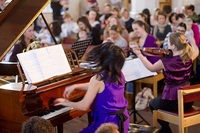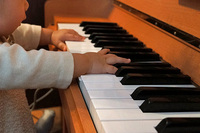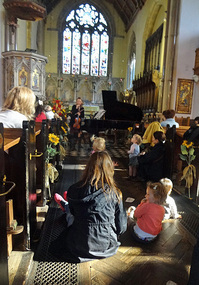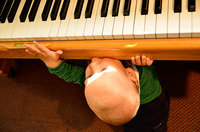English
Classical music concerts for babies No.1
Concerts targeting babies and their parents have become more common in London in the past few years. Although it has been an almost untouched area for a long time, once it happened, it turned out to be a sellout series. Why have concerts for new-born babies attracted so much attention? In fact, 'concerts for babies' have different characteristics for each project, because each one reflects the different motivations of its organizers. What kind of characteristics makes them popular? Let's find out by looking at actual cases and stories from their organizers.
When you think of concerts which children can attend, these seem to be becoming more popular in the field of classical music. Still, most family concerts are targeted at children from around the age of 7-8 onwards, or at least from 5 years old, as the participants are expected to understand the concept of the programme and to be able to join in the participatory aspect of the programme using their voice or a musical instrument. When you consider whether they are tough enough to mingle with other age groups, how much stimulation and duration they can bear, and the differences in the facilities required, such as space for pushchairs and a nappy changing area, it is natural to take care when setting the age limit for a concert. It makes it difficult to find a concert to which you can take your baby with you from the first year, and it makes it more difficult to find a concert that is devised especially for babies.
Why didn't concerts for babies developed before now? Is it because it is assumed that classical music concerts or even family concerts do not fit into babies' regular life patterns? Is it because 'attending classical music concerts' is supposed to be what babies and their mothers need least?
I have observed several examples of musical events and concerts for children in London, but only after I had a baby myself did I realize the reality. 'I thought concerts for children are well-developed in London but, in fact, it is very hard to find a concert to which you can take your newborn baby with you. Do I have to wait for several years before I can attend a classical concert?' - I thought with a sigh, looking at the brochures and websites of several concert halls.
People say that, if you want to go to a concert, you can leave your baby with a baby-sitter. However, most concerts are held in the evenings, and this is the hardest time of the day to leave your baby. The fact is; you cannot predict or control your baby's condition and mood: you cannot set the time when you can leave until you know when and for how long your baby has slept during the day: it is harder when you breast-feed your baby to leave her in someone else's care for several hours especially at night when she can become upset easily. Even if you get a ticket to a concert that you really want to attend months before the day, book a nanny, prepare for weeks for every possible situation, and hope for the best, it all comes to nothing if you baby has a fever, and you cannot easily say 'Let's hope for the best next time!'
In particular, a baby's first couple of years involves a continuously changing daily routine, even day by day, and is always filled with new challenges. The individual differences between babies are also significant so, to tell the truth, we are too afraid to book a ticket months ahead of a concert, as nobody knows what things will be like then. It is also true that we are too afraid to immerse ourselves into music thinking; what if something happens to our baby while we are miles away from home where there is no mobile signal, and we feel unnecessarily guilty about that. It is a lot easier for us if we don't check out concert diaries when we know we won't be able to attend any of them.
So, should we abondon all of the classical music concerts we used to love for several years until our baby gets older, or a few more years if we have another one? Is this the best way for your babies, or even for the classical music industry? In the meantime, mothers might feel distanced from classical music, and when their children finally grow old enough to attend an evening concert, - at an age where their lives are dominated by pop music, bringing your child to a long classical music concert for adults for the first time at that age might prove a negative experience. In fact, a baby's first one or two years is a precious time when even working mothers can go out with their baby and experience a lot of things together, before the child starts nursery or preschool.
Wishing to have a music experience with my baby in a friendly manner, I used to search online for an opportunity to do this. Nursery rhymes and easy music for children are fine, but I wanted to have an opportunity for my baby to listen to live classical music as well.
Those who realized the real situation after they had their own baby roused themselves to action and launched concerts for babies, which are still rare. Naturally, the characteristics of the concerts are different from each other, reflecting the founder's passion. From the next issue, I would like to introduce some classical music concerts where you can bring your baby with you in London. Here, I won't discuss special events that are held only once a year, for example, but would like to focus on concerts which are held regularly, such as weekly, monthly or every termly.
The upcoming articles are about 'For Crying Out Loud!' and 'Toddler Bop' by the Wigmore Hall, and 'Classical Babies'.
Report; Chigusa Futako












